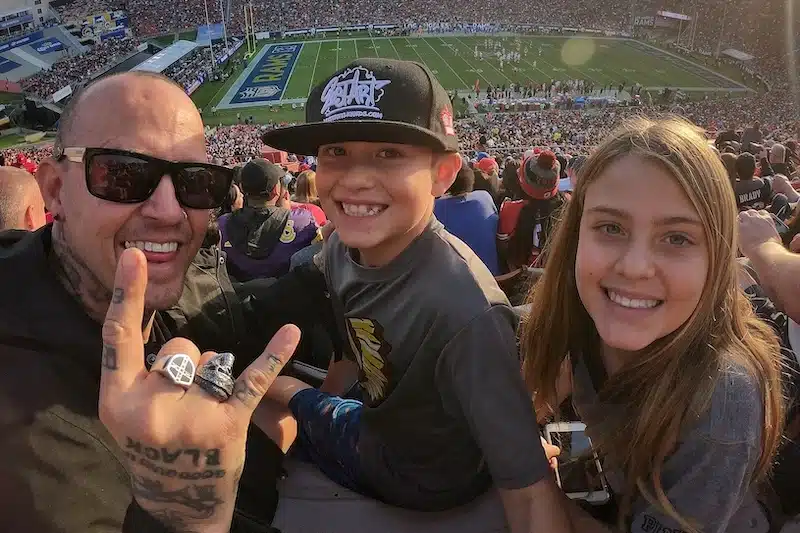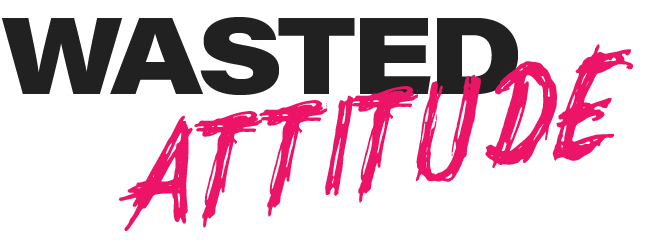Words: Miljan Milekić
It’s impossible to define Rick Thorne. Possibly because he doesn’t want to be defined. A BMX rider, musician, fashion icon, TV and podcast host, and all-around legend, Thorne always did things his way, not caring what others thought. With nothing left to prove to anyone, he does what he loves and enjoys it. A few days ago, we caught up with Rick for the interview, a conversation that was just too massive for one article, so we decided to split it in two. In this part, we talked about his life, BMX career, Monster Energy, and today’s BMX scene. For the first part of the interview, dedicated to his band Good Guys in Black, check HERE.
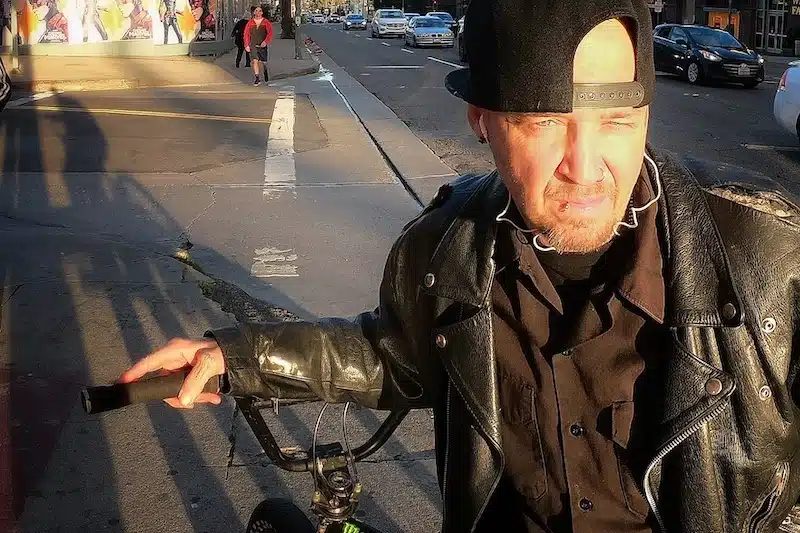
In the past years, you shifted from contest rider to some other projects. Where do you see yourself as a rider right now? Do you have anything coming up?
Rick: Well, I haven’t competed for quite a while. I competed for 25 years straight, but also I had been blessed to do a lot of TV hosting, a lot of TV shows, films… Then, I got into radio, I had started a band, and I felt like – “You know what? What do I have to prove with competing right now? Do I want to be a contest rider and just fizzle out? And then what?” So I thought, I’m gonna do everything because part of me is an entertainer, part of me is a musician, part of me is an athlete. I mean, if you would’ve called bike riding an athletic sport, okay, I’m an athlete.
So for me, where I see my riding is going, here’s the key to it all. Don’t stop riding, and don’t stop setting goals. Contests make you set goals. You go, “Okay, I’m going to go put this out there, and I’m going to do good. I’m going to be part of this industry.” For me, I felt like I had to stop competing and go do something else because there are only so many contests a year. What I’m gonna do, just compete three or four times a year, and that’s what my career is? It didn’t seem like it was enough to fulfill my need to express myself. And that’s why I do other stuff like create TV shows and host TV shows. But when you’re talking about riding, I’m not stopping riding at all. Period.
Who knows, if they ever do an old-school BMX contest series… I’m going to be 50 this year. I don’t look or move 50, I already told myself I’m gonna ride for at least 10 more years. I could do it for sure because I never stopped. If you stop at, say 25, and then you want to start riding again at 35, have you kept your body in shape? Have you kept your mind in shape, are you still flexible enough to ride? The thing is that if you never stop, you can go, and nobody’s taking this sport to how far you could actually take it. Like, there’s no 70-year-old going [mimicking old voice] “I’ve been riding for 50 years!” Hopefully, that’s me and Dennis McCoy and Mat Hoffman, because we all still ride. But I think it’s because me and people like Matt, Dennis, and some of the old school guys that ride, we really love it, beyond the contests.
I never rode just for the contest. The contest was a way for me to challenge myself. So once I learned how to do that, I didn’t need a contest to challenge myself. Even though contests do push you because you’re in the moment, you’ve worked for it, to make it happen. But if you’re able to still set goals and motivate people with riding… And what I’ve been doing with riding the most, is trying to motivate people, at least to do something with their life. It’s never too late. You don’t have to be a bike rider, it could be whatever your heart desires, just hang in there. You know what I mean? So where I see my riding is, just to keep reinventing myself, bro. You got to keep reinventing.
It’s like anything else. If you do the same thing over, and over, and over, and over again, it gets boring, it gets stagnant, and you get lazy. But when you reinvent yourself, you’re inspired on a whole another trip, and you have to do that with everything. I do that with music, I do that with riding, the way that I host, and you’re constantly, constantly doing it. And that’s just the kind of person I am. I like the challenge. So, I don’t plan on stopping to ride anytime soon. People make the contest their only value. Okay, cool, nothing wrong with it. But the second you’re not placing, you have no value. If you wanna keep riding for a long time, you have to figure out another path.
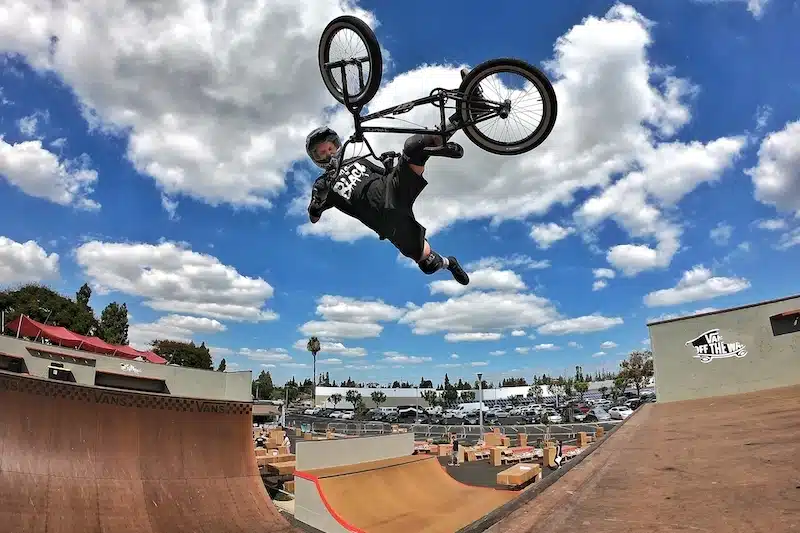
And how do you see it BMX today? I, growing up, always saw extreme sports more as a culture than as actual sports. For me, it always went hand-in-hand with music, with punk rock, hip hop… Right now, I start to feel like things have started to divide, and I’m not sure how will it influence BMX in the future.
Rick: I remember back in the day when backflips came out. Everybody was like, yeah, but people that didn’t do backflips wanted to hate on people that did. “Oh, you do backflips, you’re not a real rider. This is how a real soul rider rides.” And I was like, “Who are you to say how bike rider rides? What are you fucking Yoda? Get outta here.“ (laughs) I’ve always thought that being diversified as a bike rider is very important. Go try to ride some street, go ride some dirt, try to ride a vert ramp, learn airs, learn how to ride transition. It isn’t A or B. It isn’t like, “We’re better than you.” We’re already small enough. BMX isn’t really that big compared to the other sports, or let’s say skateboarding. It’s not even comparable. Don’t fight each other, because you’re already small enough.
But as far as the way the sport’s going, I don’t know how you feel about the Olympics, but I personally think the Olympics can take a lot of soul out of what we do by setting guidelines on what they think this sport is. I thought we, kind of, had our own Olympics with the X Games that set us apart. But just like that, when the X Games first came off, so many people in our own industry hated on us for doing it. We were sellouts and blah, blah, blah. But then, when some of those same people got offered the opportunity, it was cool now. And I’m just like, dude… If people could come together more, that would be great, but it’s easier said than done. I really don’t know the state of BMX. I think it’s lightened up a bit than in the eighties, but it’s always going to be competitive. And you could tell the people that are in it for the right reasons. If you wanna do flips and spins and whips, I’m not going to sit over here and criticize you. I’m too busy doing my thing. I’m focused on what I need to do.
I just think that things change, and people change. I’ve always just been my own person, and I just kinda thought everyone’s that way. You know, be your own person, express yourself, and be stoked to be in the moment and ride with people. Just do it because it makes you feel good, and you want to let out some aggression in a positive way. BMX has always had a hard time maintaining, meaning that the industry doesn’t really generate a lot of revenue compared to other sports. It’s hard for people to really make a living of it. When you step into contests, that becomes your routine. You get sponsors, you’re making money, and you’re able to ride longer. To be quite honest with you, it’s just a hard sport, to not be more united to build it, rather than to fight against each other.
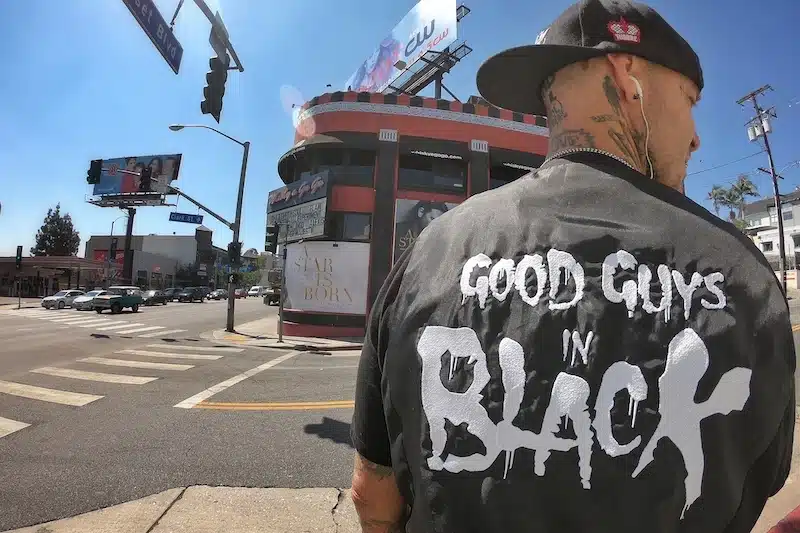
In the past, people like you, Mat Hoffman, Dennis McCoy, you guys rode everything – street, parks, vert ramps, but now it seems like a lot of riders are specializing in one discipline. Do you think it can be the dividing factor for the BMX community in the future?
Rick: It could, but at the same time, things got more competitive than it did back in the eighties and nineties. Yeah, I competed in flatland, I competed in park, I competed in vert, but as the sport has grown, it got more competitive, dude. And to put your time in to be a top flatlander, top vert rider, a top street or park rider, you would have to be riding like 24 hours a day just to keep up. But I think, back in the day, there were fewer riders and that was something people would shoot for. I don’t think not being an overall rider takes the soul out.
I’m from a generation where you rode everything, and tried to ride everything. And I think there are kids out there that probably still do. But what we see on Youtube videos, and what we see at contests, might not even necessarily be how that person lives their life. Take Garrett Reynolds, he will compete and kill it, but he’s still out there riding the streets, having fun and stuff. I don’t think what he’s doing is taking the soul out of anything. And he’s amazing. Like, what the hell? He’s killing it. Or Dennis Enarson. You have to understand, you’re not going to make a living if you’re just out there riding your bike, doing YouTube video parts. You get older, you have your wife and kids, you get a house, you got to put food on the table, and your parents are not doing your laundry anymore, but I want to do what I love to do. How can I figure that out?
I think the contest is just a moment in time. I think a lot of riders, speaking from my own self, and I would think a lot of riders are this way, it’s a way for them to push themselves, with their friends, to do some tricks they’ve been wanting to do. The contest is going to make them go to the next level. I really think that still exists in our sport. I don’t think that the soul is going to be taken out because people aren’t riding all disciplines. I don’t think that’s the case. I think that it’s just too difficult of a task, and there’s no award for it. There’s no overall title. They turned that more into, well let’s say, the best trick contest. The best trick contest is cool because there could be something that you maybe pulled off one time, and this setting, helps you set that goal to reach something, and prove to yourself that you can do it. The contests aren’t bad, they are great. I wouldn’t have done it for 24 or 25 years if I didn’t like it.
It’s just, along the way you have to… If you wanna be just a contest rider, cool. Whatever you want to do, bro. But for us, we loved riding so much, that the contest was something that we loved to go to, but we also loved to do lake jumps. To go street riding, and stay out all night riding our bikes. Just ride on the streets doing nothing. And the contents are just one element of it. You can’t put too much focus on that being the be-all and end-all of what this sport’s about. They’re just contests. It doesn’t mean that’s going to dictate how our sport goes. Well, for some people might, but for the majority of people probably not.
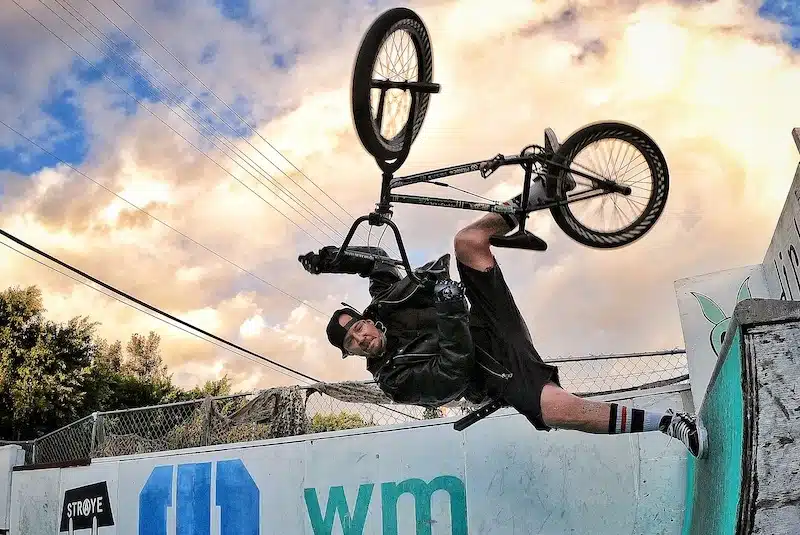
No, don’t get me wrong, I love contests. I go to contests, and I’ve met many riders there. What I am concerned about is the approach. With more and more contests, and exposure to the mainstream audience, is there a chance that people will start to approach BMX the same way they do football, or basketball, or any other traditional sport? I just think that looking at BMX that way can take away from the history, the background, and the cultural element of it.
Rick: Yeah, yeah I get you. Like turning it to a formula. Like, “Okay, what am I going to do with my life? Oh, I’ll just start working out and doing some bike tricks.” Those people don’t last anyways, though. It catches up to you, you’ll stop one day and realize “I’ve been doing something I don’t really love for the last five years.” Those people don’t dictate the be-all and end-all because they won a contest, everybody plays their part. Whatever anybody contributes back to the sport is a reflection of the different styles and attitudes of the sport.
You know, that’s been going on for a while though. I remember when X Games got popular and the prize money went from like 400 bucks to 30 grand. Dudes took it a lot more seriously because, you know, money does that, opportunity does that. It’s just the nature of the beast with money. It gets crazy, people get nuts. But it pushes the sport though. Sometimes, it can be positive, and you can see some shit that you never thought it would be pulled and go – “Oh shit, what the…” ‘Cause they got like “I wanna win, I wanna get that money!” And it goes back to that it’s not an easy way to make money. I’ve known plenty of guys who had run a bike company, and what you see in the ads and in the videos, is nothing like how they’re really living on a day-to-day basis financially. I’m using that as an example.
So then you’ve got this kid in the contest, and he’s like, “fuck, I could win 30 grand.” And they start to think about how to get in shape, they start to work out. It’s a hard balance bro, because back in the day, that was going on too. Dudes were working out, and staying in shape. But you have to, you have to work out, and you have to stay in shape. If you’re getting into the sport because you want to be “a jock” or whatever, and you wanna work out, and you got no soul, and you want to do these tricks, and the blah, blah, blah. Okay, if that’s what you wanna do. That doesn’t take anything away from what I’m doing, and I don’t feel threatened. I’m not gonna say like, “Oh well what, what the hell? That’s not really a real rider, and that’s not a soul, and you don’t know what’s up.” You’re representing you, I’m representing me. It’s cool. You do your thing, I’ll do mine. That’s just how I look at it. But I will say this, bro, I did tours and contests for years, and it’s not an easy grind either. It’s not a walk in the park. It takes a lot of mental and physical strength to keep it up.
Yeah, I realize that. I really appreciate all the time, the effort and the work those guys are putting in. From hours in the gym to endless lines in the park.
Rick: Yeah, man. But if you’re getting into the sport with the intention to make money and do this, I’ve seen them come and go, they don’t last that long. There’s not one person that’s here to save our sport, there’s not one person here that’s our salvation. We all play a part, man. Just be you, and if that’s what you wanna do, cool. Does that mean that’s what I would do? Maybe, maybe not. That’s how I look at it.
I was a victim of it. “Oh, Rick Thorne sucks! He’s a poster boy! He’s a smoke on the sport…” And I was like, “What the fuck are you guys talking about? I’m a host. Everything I did back then was a way to get the sport to people. The same thing that you’ve been trying to figure out. How can we get more people involved? If it appeared that you thought it was about me, I’m on a fucking TV, I’m an entertainer. What do you want me, to stand like a wooden stick? Like, get over it.“ The same people that known me for 20 years started to come at me. For what?
Here’s what I’m saying – just be you, and do your thing. I’ve seen some people who were getting into the sport, and be like “jocks” and then realized It wasn’t the way to go. Then, they became more about riding and doing their thing. I know I sound super liberal about it, but I’m thinking through my mind all those years of being told not to do something that I loved. At one point in time, I felt like what I fought for in the sport, I ended up fighting against. And that was something that bothered me for many years, it took me a long time to get my spirit back. And riding helped me with that.
Everyone’s got a different feeling and a different attachment to riding. If they do it for the money intentions, shit, you can do anything for money intentions. A lot of times they don’t stick. I feel blessed to find something to do that I love, but not everybody’s going to do that because they love it. They’re going to do it for multiple reasons, but there are no guidelines for what we do. There’s no textbook. I always went against the textbook bullshit. I do what I want, especially with something that I love. I can’t tell people not to go work out and do good in a contest, because I think that is not a soul rider or whatever. Dude, that’s your deal and your gig, just be positive. Don’t hate others for what they do. Send that positive vibration out there, man. Or just question, it’s okay to question things, everybody’s different.
I think I reached a point in my life where dudes respect me for how long I’ve been in it, how I keep reinventing myself, and how I never give up. But I went through all the crap, and I’m able to say that what I’ve learned from it, is just to keep a positive outlook. Not just on what you’re doing, but the sport in general and what’s best for it. That’s the only way we could make it grow in the right direction or a positive direction.
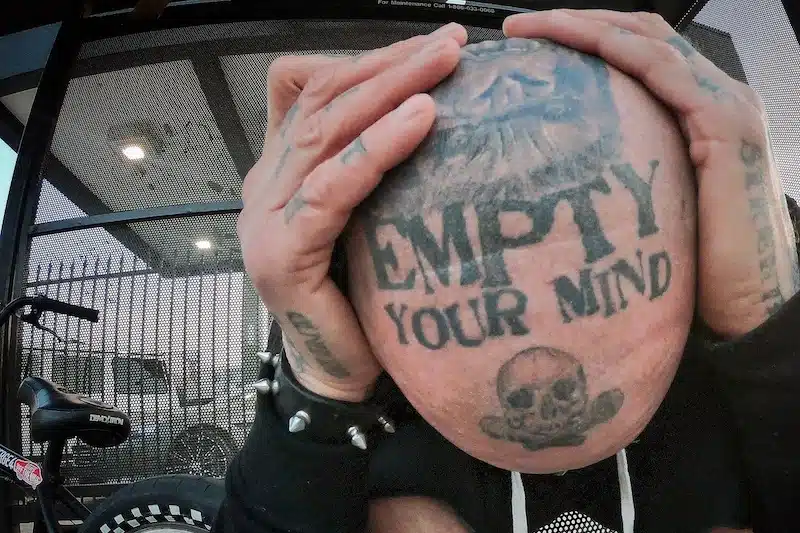
You’ve been on Monster Energy for as long as I know you. How long are you working with them, and how would you describe your relationship?
Rick: When I first got on Monster – I did an episode of “Monster Garage”, a show Jesse James used to do. They took an RV, and they made it into a mini ramp, and then me and Tony Hawk rode the ramp, while it was driving in Venice Beach. It was really cool, man. It was a trip riding that ramp in the movie, it’s crazy. And, this guy came up and gave me his card and said – “Hey, I’m working for this company, Monster Energy, you should check us out.” I heard about energy drinks then, but they were so new, everything was new. So I called them and said like, “Hey man, this is what I do, I remember meeting you and blah, blah, blah.” Next thing I know I got put on the team.
But, there was no team, I was the first athlete Monster ever sponsored. The very first, which is like, wow. It’s pretty cool to think how much that company’s grown, and how long I’ve been there. The relationship I built with them has been so solid, and it’s super amazing, dude. I’ve always liked being with Monster because they always give back to riders. I put together a skatepark tour once, where my band played, I did a contest, BMX and skate, and they sponsored it. I came to them, and I said, “Hey, I’m doing some stuff with my band,” and they helped me with tour support for my band. “Hey, I’m doing this on Warped Tour,” they helped me with my band on Warped Tour. They’ve always done cool stuff for people that they really feel like, work for their brand. It’s still got a family value to it, that I appreciate. They always backed everything that I’ve done, they’ve been really supportive of me, and that’s why I think we’ve had such a good relationship.
I just like riding for people that you feel like you’re part of their team, and not just trying to get a paycheck, and be disconnected from what the brand’s about. And with Monster, they’ve always been super supportive. They were open about me starting a band, they were open about all the TV stuff, they were open about the riding, and really, really embraced that. Some other people that I rode for, not all brands, but there were some that have, they were like, “Well, we want you specifically for your contest results.” I started a band, and they were like, “What are you doing that for?” They didn’t see value in it as much. And Monster has always seen the value in all the disciplines and things that you’re doing, so it’s been really cool. I’m grateful and very blessed to still be part of the team.
So, right now, who would be your favorite riders or the ones you really love to watch?
Rick: I like Dennis Enarson a lot. That dude just absolutely kills everything he rides. It depends on the style of riding, but, I mean, obviously, Garrett Reynolds kills it too. We’re talking about park and street kind of guys, those guys destroy the game. I also like Dakota Roche, I like him a hell of a lot. I think he just got such a fucking great style, he’s just mad, he’s like a power rider. I think he’s sick. I also like Chad Kerley, he’s pretty rad. I like the stuff he does. There are just so many different riders nowadays, who are just so incredibly good. Guys you might not have heard of, and you see something online, and be like, “Dude, what? This dude is sick!”
It depends on the style of riding. I mean, I could sit here and tell you right now, I love watching Mat Hoffman ride to this day like I did when I first met him, back when he was fifteen. He’s Mat, he’s just developed his own style. I’m best friends with Dennis McCoy, I grew up with Dennis McCoy in Kansas City. And Dennis has always been one of my favorites still to this day because he still keeps pushing it. It’s hard to narrow it down to just a couple, or a few, cause there are so many good, good, good riders.
I don’t know why, but for some reason, I was kinda expecting you to say, Kevin Peraza.
Rick: Of course, yeah, I forgot. Kevin Peraza for sure. That’s what I’m saying, there’s so many. He’s amazing. And, I’ll tell you, Larry Edgar is, too. Both of those guys are insanely good. And they’re super cool dudes. There’s an example – everyone that I just named competes in contests. And all of them are cool. All of them are rad. So, contests aren’t bad. All of them are super rad dudes that ride for more reasons than just the contest.
There are a lot of good guys compared to when we were growing up. Maybe there were a lot of riders then, that we just didn’t know of because there was no internet, you know? I like to watch anybody that’s riding, and you can tell they really love it. That always motivates me. Or, you see a video or a photo, and it makes you wanna go ride right now. It’s inspiring, and there’s a lot of people that inspire me. There’s probably a group that I didn’t name, but I just can’t think of everybody right now.
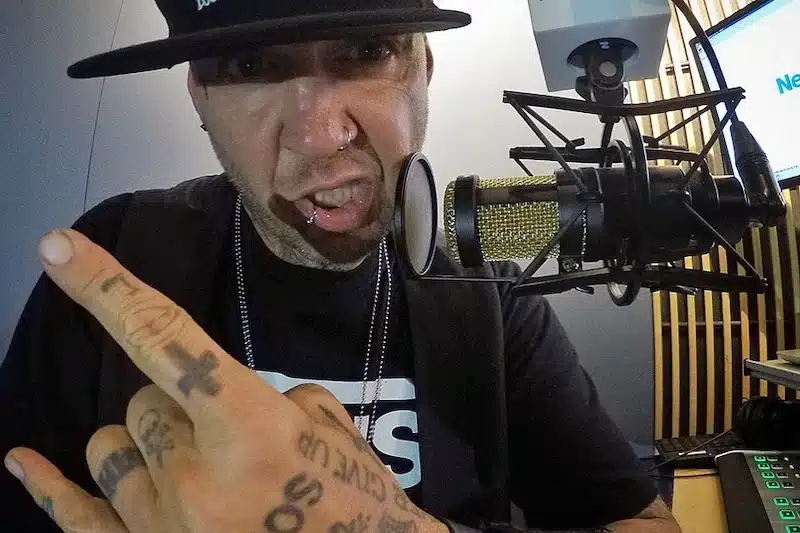
A few years back, you were a part of Mat Hoffman’s, and then later Tony Hawk’s video games. How did it feel at the moment, and how does it feel now to be remembered not only in the BMX culture but also in the gaming community?
Rick: Man, when those things came up, it was a trip. Looking back on it now… When it was going down, we’re like – “Oh yeah, we’re in video games, it’s cool, huh?” It was so rad, and we were playing it, but we didn’t think, at least me, I didn’t know the effect that it would have. Even though I knew it would have an effect. It’s super special to be chosen to be in Mat’s and Tony’s games, for sure. It’s just something that I’m very blessed to be able to do. It’s a weird feeling, I didn’t really think about it when we did it, you just did it, you know what I mean? Does that make sense? You didn’t know what it would be like, you were just excited to be part of it.
Sometimes I forget things that I’ve done, and then I’ve been going through all these old VHS tapes, and I was like, “Whoa, I forgot about that. I forgot about that, too.” So, to be part of those video games, I’m super honored. It’s a great compliment when someone thinks I’m good enough to be in their game. I recently showed my kids those games, too. They didn’t know. My kids didn’t know what I did for many years. I didn’t tell them much of anything that I did, I just let them figure it out themselves. And it wasn’t till a couple of years ago, I pulled out an old PlayStation, gave it to my son, and said like, check this out. And he’s like, “You’re in a video game?!” I did that intentionally to just use it as inspiration. To say, look, I did this. Just follow your dreams. I mean being in a video game was never a dream, but when video games came out they were super popular, and you were like, “Dude, I would love that.” That was like a new dream, you know? So when it came true, it was cool. I’m super grateful.
And I’m not sure you or even the people who made those games realize the influence they had. I was born in ’89 in Serbia, on the totally opposite side of the world, and those games were the thing that introduced me and my friends to BMX, skateboarding, but also to music. Punk music, hip hop music, it all started from there for us, so the impact was huge, possibly even bigger than on the kids in the US.
Rick: Well, it served a rad purpose, then. It got you into riding, got you into something positive. It got you into the culture and the music… I mean, shit, the music, and the sports so go hand in hand. It served a rad purpose, but when we did it though, we didn’t, I mean at least for me, I didn’t think past that. I didn’t even put any thought into it like that. And to hear you say that is pretty rad. We helped somebody to get involved in something we love. Awesome. That’s really what everything that I do is about. Yeah, I’m expressing myself. Yeah, you want to feel good about yourself, but along the way, if you could inspire someone… So, to hear that those games were inspiring to you is great, and that’s a pretty great feeling to think that, not only you but probably a group of other kids, too. If we inspired them to go and check this world out, to start riding or skating or whatever, that’s pretty rad.
Follow Rick Thorne:
Website: rickthorne.tv
Facebook: facebook.com/thornestyle
Instagram: instagram.com/rickthorne
Twitter: twitter.com/RickThorne
Youtube: youtube.com/rickthorne
Podcast: spotify.com/show/6nyKBKV5vxB5HPFizjOHby?si=10dac7d0d1ba4113
